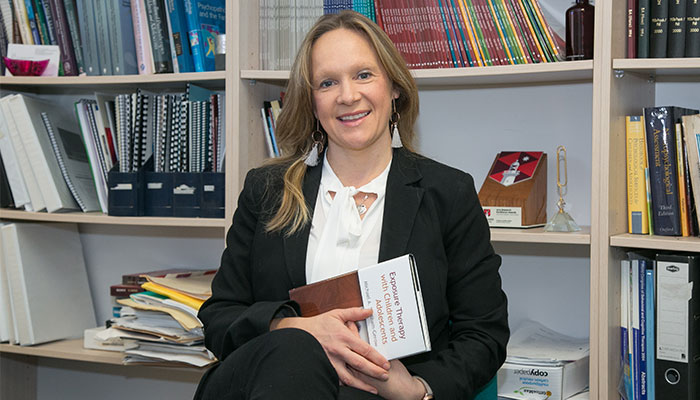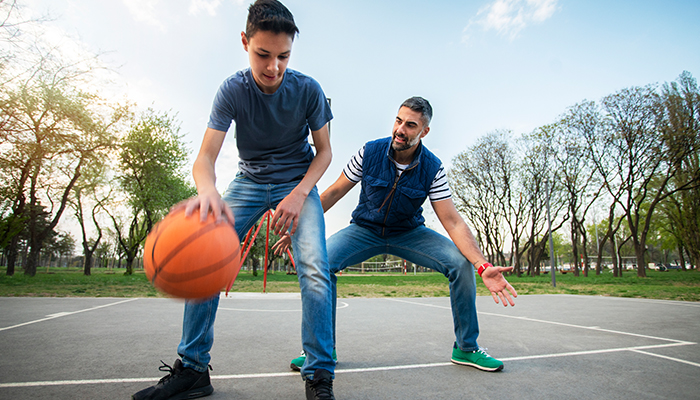New research shows that fathers who encourage their children to be socially assertive and to step outside of their comfort zone may help their children avoid social anxiety in young adulthood.

New study: The research is the first of its kind to examine the impact of challenging parenting behaviours on young adults, explains Hudson.
“The study looks at emerging adults, who are defined as a group aged from 18 to 25,” says Professor Jennie Hudson, who heads up Macquarie University’s Centre for Emotional Health. At this age, anxiety disorders are the most common mental health problem, particularly for females, she adds.
“Most research on the role that parenting plays in anxiety focuses on the child’s interaction with the mother. In this study, we show that fathers play an important role in encouraging children to push themselves a bit more socially and take safe risks,” says Hudson, who explains that this kind of parenting is called ‘challenging parenting behaviour’.
Examples can include encouraging your child to stand up for their opinions or beliefs or encouraging them to travel alone. The stereotype where dad won’t let their kid win at a game of cards or soccer is another classic way that fathers challenge their children.
Another interesting finding in the study was that although both parents used challenging parenting behaviours, the link to social anxiety in their emerging adult children was stronger for fathers, Hudson says.
Emerging adulthood is a period of exploration, change and identity formation.
The study, published in the Journal of Cognitive Therapy and Research in September, also found that if either parent was overly critical (using what is called ‘rejecting parenting behaviours’), emerging adults were more likely to have more signs of general anxiety and stress. However, the two other common parenting styles tested in the study – warmth and overprotection – didn’t correlate with any change in anxiety scores in this age group.
There have been a number of studies around the role that challenging parenting behaviours play in anxiety in infancy and in childhood, but this was the first to look at the impact on emerging adults, Hudson says.

Confidence booster: Professor Jennie Hudson's research found that challenging parenting - particularly from fathers - helps children become more confident young adults.
Carrying out the research
The researchers surveyed 442 people in the ‘emerging adult’ category, who reported on their anxiety symptoms and on their parents’ behaviours.
“Emerging adulthood is a period of exploration, change and identity formation and is often overlooked in the parenting literature,” says Anna Smout, lead author on the paper and a student researcher with Hudson and Dr Rebecca Lazarus, who is a co-author on the paper.
“The age range also has high rates of onset and occurrence of anxiety disorders such as panic disorder, social anxiety and agoraphobia.”
She points out that because young adults in Australia now typically remain in their parents’ homes for much longer periods of time, parents may play a role in their children’s behaviour well into adulthood.
- What does stress do to the brain? Busy Bees reveal surprising insights
- Mineral maps will help shift Australia to renewable energy
The team developed a questionnaire specifically for emerging adults which explored three categories of challenging parenting behaviours. These were: social assertion and personal fulfilment; curiosity and interest in trying new things; and competitiveness.
They also measured three types of anxiety symptoms – generalised anxiety, stress, and social anxiety.
Survey participants answered questions about how their own parents had behaved. In challenging parenting, a parent will encourage their child to try new things and take safe risks – and they won’t step in to help out too early.
Some parents might be more likely to shelter their children from disappointment and give their child more help than they need according to their age or abilities. “This can actually increase stress or anxiety because children are led to believe they need help and protection from the outside world,” explains Smout.
Parents who use rejecting behaviours tend to discipline children for small offences and are overly critical, Smout says.
Role for dads
Smout says that traditional gender roles emphasise the idea that physical play is the domain of fathers, as is encouraging children to take risks and to be independent.
“That led researchers to believe that challenging parental behaviour could be more characteristic of fathers than mothers,” she says.

Lose-lose situation: Children whose fathers let them win are more likely to develop anxiety, warns Hudson.
“Our team’s previous work has shown challenging parenting from both mothers and fathers is important for emotional health in children and teens,” adds Hudson.
“An interesting finding in the current study was showing that fathers were important for this emerging adult period.”
It turns out that those dads who challenged their kids to endless games of chess, or basketball, or backyard cricket and never let them win may have been helping to develop less anxiety in their kids as they became emerging adults.
In time, most kids will start to beat dad to the ball or sneak a chess move past him, and that hard-won win will give them confidence. Their kids are likely to spare no mercy for their dad once they get a taste of victory – and perhaps that’s the subtle goal for most dads all along.
Professor Jennie Hudson is Director of Macquarie University's Centre for Emotional Health.



